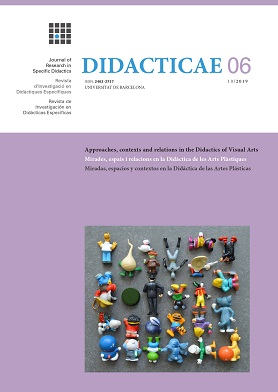Aplicació de la metodologia de projectes de treball de llengua en els graus de mestre/a d'Educació Infantil i Primària
Language project-based learning methodology applied in the degrees of Childhood and Primary School Studies
DOI:
https://doi.org/10.1344/did.2019.6.144-158Keywords:
project-based learning, integrated projects, language didactic sequences, advertising discourse, teacher training.Abstract
This paper presents a didactic experience performed in the subject Catalan Language for Teachers (1st year of the Degrees of Childhood and Primary School Studies) in Florida Universitària (campus attached to the University of Valencia), and that is part of the annual Integrated Project entitled: “We dream of the school we want”. The aim of the project is, in teams of 5-7 students, to prepare the advertising campaign of the educational centre in which students would like to develop their future educational action. This methodology allows interlinking theory and practice, working cooperatively and developing, in an integrated way, the specific competences of the subject and the transversal competences of teamwork, innovation and use of ICT. We believe that the interest lies in analyzing the application of the methodology of work projects of language in the specific field of university studies. Our objective was to verify whether these practices make it possible to advance teaching innovation and if they are an effective tool for increasing the motivation of students and for achieving competency and integrating learning, in accordance with the objectives that today’s society demands for future teachers’ linguistic education.
References
Camps, A. (1994). Projectes de llengua entre la teoria i la pràctica. Articles, 2, 7-20.
— (1996). Proyectos de lengua, entre la teoría y la práctica. Cultura y Educación, 2, 43-57.
— (2012a). La investigación en didáctica de la lengua en la encrucijada de muchos caminos. Revista Iberoamericana de Educación, 59, 23-41.
— (2012b). Intervenció, innovació i investigació. Una relació necessària per a les didàctiques. Lenguaje y Textos, 35, 107-114.
Deleuze, G., i Guattari, F. (1997 [2010]). Rizoma. Introducción. València: Pre-Textos.
Dolz, J. (1992 [2009]). Los cinco grandes retos de la formación del profesorado de lenguas, FPSE, Université de Genève (Suisse). En V. Siget (Coord.) Simpósio Internacional de Estudis de Gêneros Textuais, Caxias do Sul, RS, Brasil.
Engeström, Y. (1987). Learning by Expanding: An Activity-Theoretical Approach to Developmental Research. Helsinki: Orienta-Konsultit.
Francisco, A. (2011). La subjectivitat a l’aula. Potenciar el pensament crític a través de l’anàlisi publicitària. Articles de Didàctica de la Llengua i la Literatura, 54, 93-103.
Galeana, L. (2014). Aprendizaje basado en proyectos. Revista Digital ceupromed. Diponible en: http://ceupromed.ucol.mx/revista/PdfArt/1/27.pdf [Última consulta: octubre 2017].
Guasch, O., i Ribas, T. (2012). Projectes de treball per a ensenyar i aprendre literatura. Articles de Didàctica de la Llengua i la Literatura, 57, 5-7.
LaCueva, A. (1998). La enseñanza por proyectos: ¿mito o reto? Revista Iberoamericana de Educación, 16, 165-190.
López, A. M., i Lacueva, A. (2007). Enseñanza por proyectos una investigación-acción en sexto grado. Revista de Educación, 342, 553-578.
Manresa, M.; Duran, T. & Ramada, L. (2012). Les TIC en les seqüències didàctiques de llengua i literatura. Articles de Didàctica de la Llengua i la Literatura, 57, 38-48.
Margallo, A. (2012). La formació de lectors literaris a través de les seqüències didàctiques en forma de projecte. Articles de Didàctica de la Llengua i la Literatura, 57, 22-35.
Morin, E. (1999). Los siete saberes necesarios para la educación del futuro. Argentina: Nueva Visión-UNESCO.
— (2006). Humanidad de la Humanidad. Cátedra: España.
Moursund, D. G. (1999). Project based learning using information technology. Ph. D, ISTE Publications.
— (2002). Project based learning using information technology. Trujillo: ISTE Publications.
Muñoz, A., i Díaz, M. R. (2009). Metodología por proyectos en el área de conocimiento del medio. Revista Docencia e Investigación, 19, 101-126.
Reverte, J. R., Gallego, A. J., Molina, R., i Satorre, R. (2006). El aprendizaje basado en proyectos como modelo docente: experiencia interdisciplinar y herramientas groupware. Proyecto de innovación tecnológico-educativo e innovación educativa de la Universidad de Alicante.
Rodríguez Gonzalo, C. (Ed.) (2008). La lengua escrita y los proyectos de trabajo. Propuestas para el aula. Catarroja: Perifèric Edicions.
Taboada, G., Touriño, J., i Doallo, R. (2010). Innovación docente en el EEES de cara a la práctica profesional a través del aprendizaje basado en proyectos. Actas XVI Jornadas de enseñanza universitaria de la informática. Santiago de Compostela.
Vázquez, J; Barrabates, M., i Rosel, V. (2000). Metodología de aprendizaje basada en problemas. Perú: Proyecto Uni-Trujillo.
Downloads
Published
Issue
Section
License
Copyright (c) 2019 Didacticae: Journal of Research in Specific Didactics

This work is licensed under a Creative Commons Attribution-ShareAlike 4.0 International License.
The authors who publish in this journal agree to the following terms:
- Authors retain copyright and grant the journal the right of first publication.
- Submitting a paper does not involve paying any fees.
- Texts will be published under a Creative Commons Attribution Share-Alike 4.0 International License that allows others to share the work, provided they include an acknowledgement of the work’s authorship, its initial publication in this journal and the terms of the license.
- When citing works published in Didacticae, both the autor and the journal must be cited.
- Didacticae does not accept any responsibility for the points of view and statements made by the authors.



